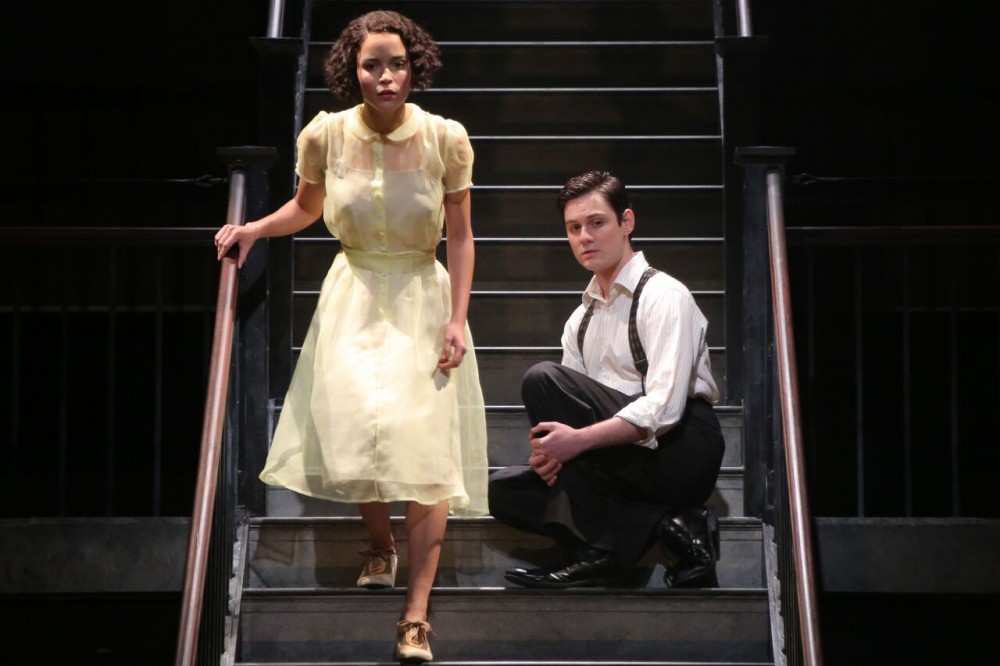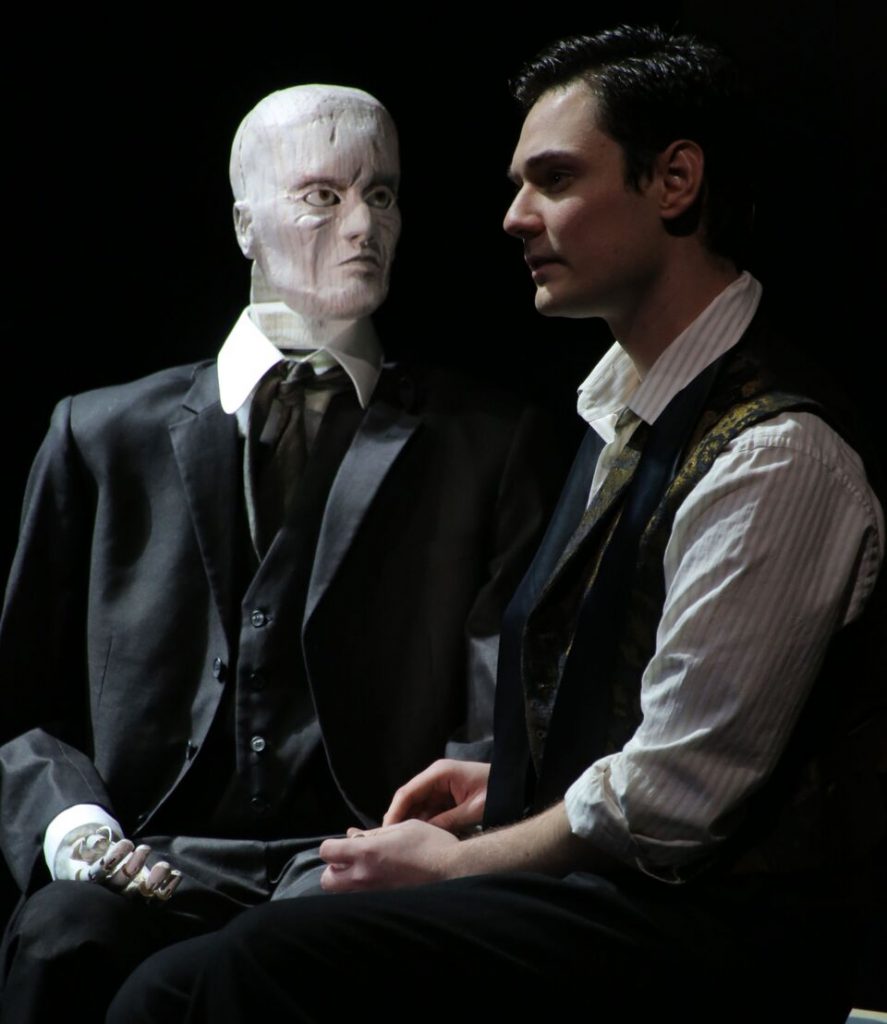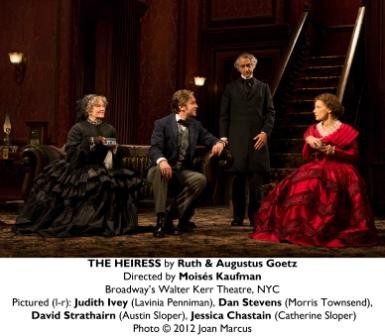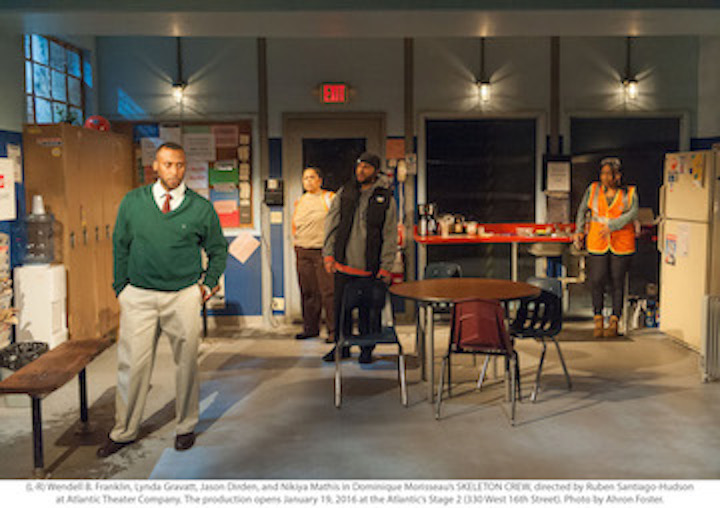by Carol Rocamora
There are lots of ways to tell a story in the theatre. But there are few as arresting and haunting as the way Adrienne Kennedy tells her new tale at the Theatre for a New Audience.
After a nine-year hiatus, this celebrated American playwright (now 86) has returned with He Brought Her Heart Back in a Box, her tantalizingly titled new offering. Set in Georgia and New York City in 1941, it’s essentially the story of two young lovers – a white boy and bi-racial girl – and their struggle to be together while warding off ghosts from the past.
By “essentially,” I mean that there’s much more to this sliver of a forty-five-minute play, both in terms of form and content. Told in a series of parallel monologues by Chris and Kay, the play’s only characters, we learn about their origins – he, the son of a ruling racist in the town where they grew up; she, the daughter of a white man and a black peach-picker who was fifteen when she gave birth to Kay. Chris’s father was an architect who designed their town’s racially segregated plan, while at the same time keeping black mistresses. (He established a graveyard where these women and their offspring were buried.)
Chris’s father haunts the stage – literally – in the form of a spectral white dummy whom Chris frequently addresses, and who at one point rises nightmarishly (suspended from wires) to confront the lovers.
Kay’s story has its own phantoms. Her mother died shortly after she was born – either by suicide or murder, it’s not clear (hence the play’s surreal title, repeated throughout the narrative).
So while the story moves forward (Chris goes to New York to become an actor, hoping Kay will soon follow), it keeps reaching back into the past. At the same time, there are brief interruptions of radio announcements, reminding us that there’s a world war going on (at one point there’s a reference to a trip that Chris’s father, a Nazi sympathizer, takes with his son to Germany). To add to these narrative “shards,” there are a collage of seemingly unrelated cultural elements – including a reference to Grimm’s Snow White (from whence the play’s title comes), excerpts from a Christopher Marlowe’s revenge tragedy, and snippets of Noel Coward songs. The effect is fragmented, poetic, and surreal.
Designers Christopher Barreca (sets) and Donald Holder (lights) have created a kind of dreamscape that reflects the play’s fragmentation. Before you enter the auditorium, there’s a model of the Georgia town where Chris and Kay were raised. It’s the last stronghold of realism before you enter the theatre itself – a cavernous empty space, with a steep staircase in the center that seems to lead nowhere. Shard-like images of the town (by Austin Switser) are projected on the flanking brick walls, while original music (by Justin Ellington) underscores much of the dialogue. Montana Levi Blanco’s colorful costumes offer flashes of romance and hope. The combined visual and aural impact is spellbinding.
Like the fragments of a Chagall painting, the elements of Kennedy’s story coalesce into a kind of wondrous dream – beautiful and at the same time terrible, given that this is a play about racism (past and present), Nazism, and two families torn by violence and tragedy. Under Evan Yionoulis’s skilled direction, Juliana Canfield (as Kay) and Tom Pecinka (as Chris) offer heartwarming, heartbreaking portrayals of two young souls with their lives ahead of them, who cannot shake the specters of the past.
“The scene is memory and is, therefore, nonrealistic. Memory takes a lot of poetic license. It omits some details; others are exaggerated… for memory is seated predominantly in the heart.” So says Tom, the narrator of The Glass Menagerie. Like Tennessee Williams before her, Kennedy makes magic from memory – of her own haunted, deeply moving past from which this poetic play has sprung.
Photos: Gerry Goodstein
He Brought Her Heart Back in a Box, by Adrienne Kennedy, directed by Evan Yionoulis, at Theatre for a New Audience, now through February 11.

























